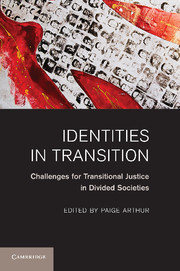Book contents
- Frontmatter
- Contents
- Acknowledgments
- Author Bios
- Introduction: Identities in Transition
- PART I IDENTITY IN TRANSITIONAL JUSTICE MEASURES
- 1 Indigenous Peoples and Claims for Reparation: Tentative Steps in Peru and Guatemala
- 2 Truth Telling, Identities, and Power in South Africa and Guatemala
- 3 Security System Reform and Identity in Divided Societies: Lessons from Northern Ireland
- 4 Staging Violence, Staging Identities: Identity Politics in Domestic Prosecutions
- 5 International and Hybrid Criminal Tribunals: Reconciling or Stigmatizing?
- 6 Silences, Visibility, and Agency: Ethnicity, Class, and Gender in Public Memorialization
- PART II IDENTITIES, TRANSITION, AND TRANSFORMATION
- Index
- References
3 - Security System Reform and Identity in Divided Societies: Lessons from Northern Ireland
Published online by Cambridge University Press: 01 March 2011
- Frontmatter
- Contents
- Acknowledgments
- Author Bios
- Introduction: Identities in Transition
- PART I IDENTITY IN TRANSITIONAL JUSTICE MEASURES
- 1 Indigenous Peoples and Claims for Reparation: Tentative Steps in Peru and Guatemala
- 2 Truth Telling, Identities, and Power in South Africa and Guatemala
- 3 Security System Reform and Identity in Divided Societies: Lessons from Northern Ireland
- 4 Staging Violence, Staging Identities: Identity Politics in Domestic Prosecutions
- 5 International and Hybrid Criminal Tribunals: Reconciling or Stigmatizing?
- 6 Silences, Visibility, and Agency: Ethnicity, Class, and Gender in Public Memorialization
- PART II IDENTITIES, TRANSITION, AND TRANSFORMATION
- Index
- References
Summary
When a divided society attempts to make the transition from violent conflict to peace, it is required to engage with what in its past governance arrangements made harmonious communal living so dysfunctional and seemingly impossible. The new dispensation will, among other things, face the daunting challenge of rehabilitating those state institutions most responsible for violations of human rights. Reform of security organizations is generally writ large in any transitional justice “to do” list. However, the reform of organizations cannot be seen as an end in itself. Such reform adds value only to the extent that it provides an entry point to address deeply felt, often identity-based grievances and paves the way for wider systemic and holistic engagement, facilitating people of differing backgrounds, views, and aspirations to feel respected, safe, and secure.
It is not presumed that “solving” identity conflicts should be the goal of security system reform (SSR), or that identity conflicts are the only important conflicts or points of resistance. In some ways, conflicts among identity groups can, in fact, obscure other difficult and important challenges. This chapter aims to highlight only how identity conflicts may have or appear to have an impact on available legal and policy choices in transitional contexts. This chapter particularly examines the salience of ethnoreligious/political identity in the reform and rehabilitation of security provision in Northern Ireland to assist in framing some broader dilemmas and options, informed by the empirical reality of one particular jurisdiction.
Information
- Type
- Chapter
- Information
- Identities in TransitionChallenges for Transitional Justice in Divided Societies, pp. 87 - 117Publisher: Cambridge University PressPrint publication year: 2010
References
Accessibility standard: Unknown
Why this information is here
This section outlines the accessibility features of this content - including support for screen readers, full keyboard navigation and high-contrast display options. This may not be relevant for you.Accessibility Information
- 6
- Cited by
